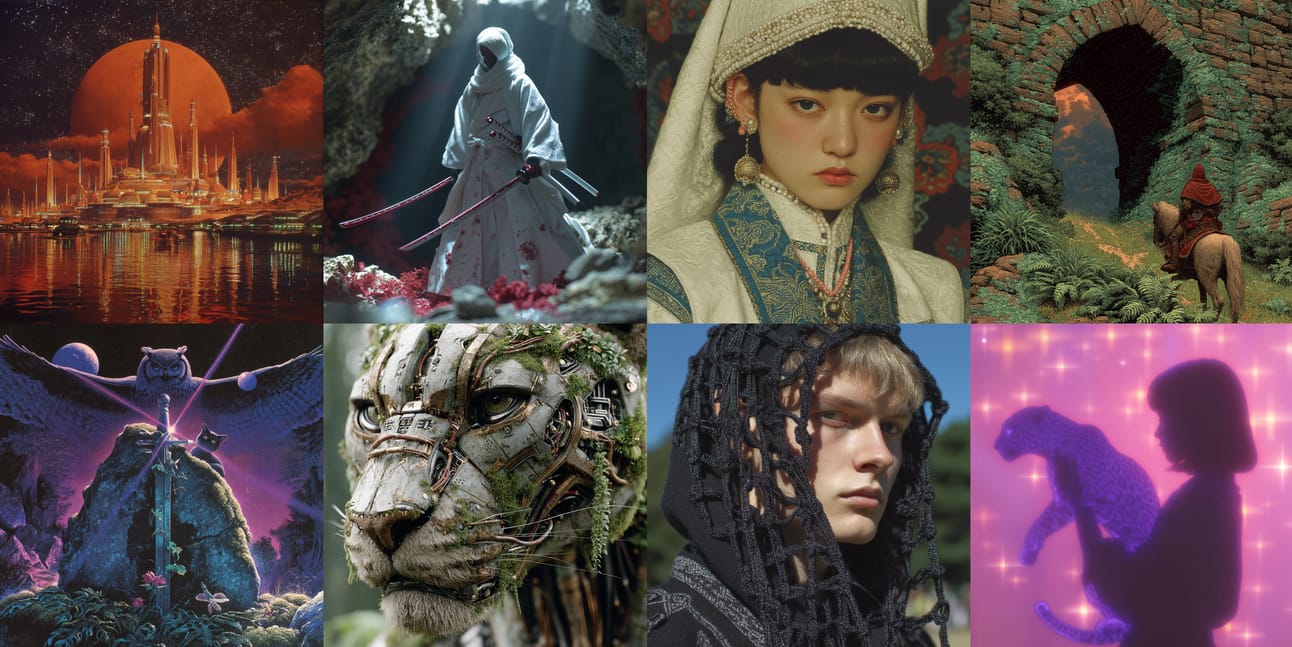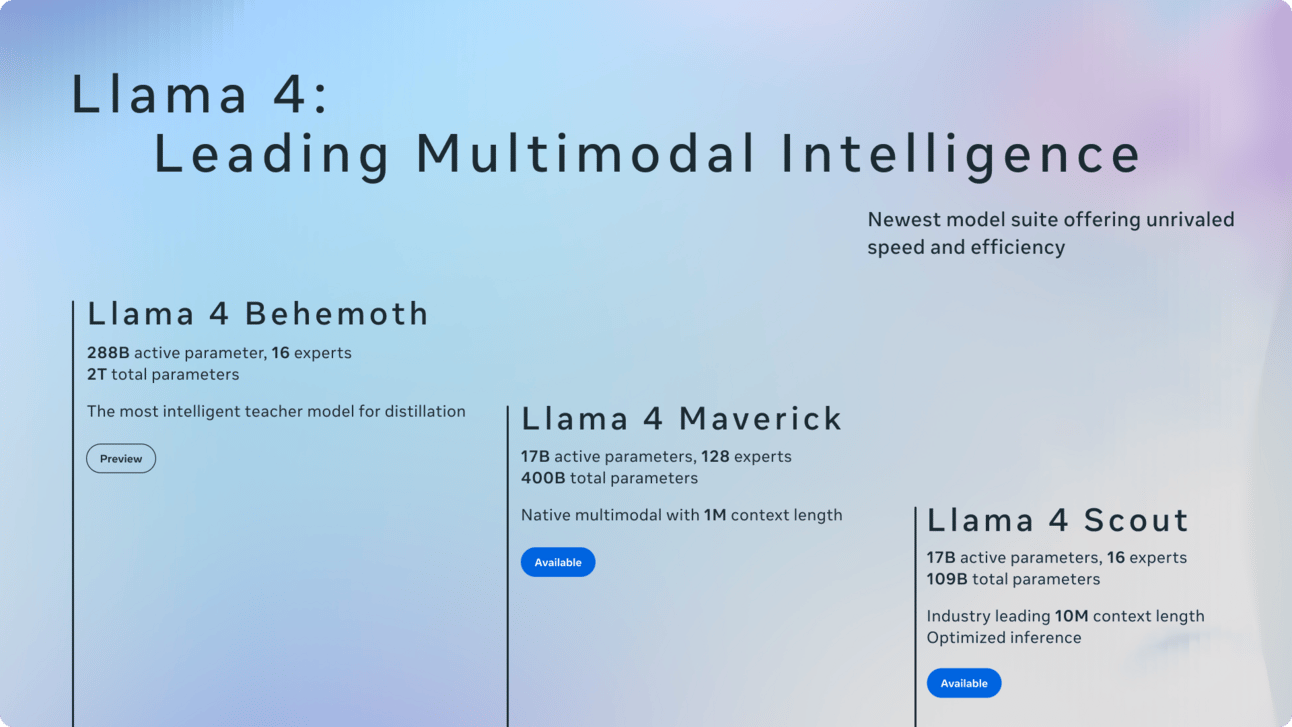- AI Weekly Insights
- Posts
- AI Weekly Insights #72
AI Weekly Insights #72
Personalized Art, Smarter Assistants, and AI with Cinematic Vision
Happy Sunday,
AI just hit the turbo button. In ‘AI Weekly Insights’ #72, Midjourney is making art more personal with V7, Runway’s new video model is pushing boundaries in Hollywood, and Microsoft’s Copilot is stepping up as your all-in-one digital companion. Plus, Meta’s Llama 4 is here and it’s not pulling any punches.
Ready? Let’s dive in!
The Insights
For the Week of 03/30/25 - 04/05/25 (P.S. Click the story’s title for more information 😊):
What’s New: Midjourney has launched V7, a major update that adds more personalized image generation, improved text handling, and a new low-cost "Draft Mode."
Improved Experience: This new version, currently in early testing (alpha), introduces personalization profiles. Users can create one by rating 200 images, helping the system learn their visual preferences. From then on, the model automatically tailors image results to match their style. V7 also understands prompts better, producing images with clearer textures and more consistent details. The new Draft Mode makes it easier to generate quick previews, handy for brainstorming ideas. Users can still choose between Turbo and Relax rendering modes, and Midjourney says new features will roll out every week or two for the next couple of months.
Why It Matters: V7 comes at a key moment, just after OpenAI launched their improved image tool for ChatGPT. Midjourney has been teasing this update for a while, and now it's clear they want to stay ahead in the world of visual AI. One of Midjourney's strengths is its focus: it only does images, not text or code. This focus lets it go deeper into creativity. Personalization profiles help users shape their own artistic style, making the process feel more collaborative. Draft Mode gives artists a smarter way to test ideas without using too many credits. However, not everything is perfect as some features, like image upscaling, are still missing. Still, V7 makes Midjourney even stronger as a leader in generative art and shows how fast the competition in this space is moving.

Image Credits: Midjourney

Image Credits: Midjourney
What's New: AI startup Runway has launched Gen-4, an advanced AI model that generates high-fidelity videos with improved consistency and realism.
Gen-4 Details: Runway's Gen-4 model boasts the ability to generate dynamic videos with consistent characters, locations, and styles across scenes. It allows users to create environments by using visual references and instructions, all without additional training. This model marks a significant leap from its predecessor by adhering closely to prompts and simulating real-world physics. Backed by giants like Salesforce and Nvidia, Runway differentiates itself by partnering with a major Hollywood studio and funding AI-generated films. However, it faces competition from companies like OpenAI and Google.
Why it Matters: Gen-4’s ability to generate detailed video content could shake up the film and TV industry by giving creators more control than ever before. But there are trade-offs. A 2024 study predicts AI tools like this could displace over 50,00 entertainment jobs by 2027. As Runway scales and continues to innovate, it will also have to navigate legal questions around copyright and data usage. This tool is being integrated into professional pipelines, backed by serious industry partnerships. That could accelerate a shift in how visual content is made, especially for lower-budget productions looking for high production value. The stakes are high: Gen-4 may be paving the way for a new kind of filmmaking, but we’ll need clearer rules and industry standards to ensure that innovation doesn’t come at the expense of fair credit, creative integrity, or livelihoods.
What's New: Microsoft has rolled out a major update to Copilot, transforming it into a more personal and capable AI companion with new features like memory, real-world vision, deep research, and podcast generation.
Copilot Upgrade: Microsoft's latest Copilot update introduces a range of enhancements that make AI more personal, proactive, and useful:
Memory & Personalization: Copilot can now remember key personal details, like food preferences, favorite movies, or important dates, and use them to tailor responses and suggestions.
Actions: Copilot can now complete tasks on your behalf, like booking dinner, sending gifts, or reserving flights, through simple chat commands.
Copilot Vision: Now on mobile and Windows, Vision uses your phone's camera or PC screen to analyze the world around you and provide suggestions.
Pages: This new feature organizes content into structured documents that evolve with your workflow, from brainstorm to final draft.
Podcasts: Copilot can generate custom podcasts based on your interests or research, offering a new way to digest complex information through audio.
Shopping: Copilot tracks price drops, compares products, and can even help you buy items directly from the app.
Deep Research: This tool handles multi-step research, combining data from websites, documents, and images to save time on complex tasks.
Copilot Search: Bing search now blends traditional and generative search for more comprehensive, sourced results.
Why it Matters: With this sweeping upgrade, Microsoft is turning Copilot from a helpful assistant into a truly personal AI assistant. Features like memory and actions give it a better ability to understand context and follow through on tasks. The move into podcast creation and visual interactions also pushes Copilot into more creative and immersive territories. Microsoft is clearly trying to build an AI that can support you in your everyday life whether you're working, relaxing, or planning something big. But with this leap forward comes a new challenge: managing the balance between personalization and privacy. If executed well, this evolution could redefine how we interact with AI across productivity, creativity, and everyday problem-solving.
What's New: Meta has introduced Llama 4, a new family of AI models named Scout, Maverick, and Behemoth. These models offer improved performance, especially in understanding images, videos, and text.
Llama 4 Breaks New Ground: The Llama 4 models use a smart system called "mixture of experts" (MoE), which lets the model send each task to the most qualified part of the system. This makes the models faster and more efficient. Maverick is built for general chatting and creative writing, with 400 billion parameters making it very powerful. Scout is great at summarizing long documents and understanding large pieces of computer code, thanks to its ability to handle long inputs. Behemoth hasn’t been released yet, but it’s expected to be even stronger as it helped train Scout and Maverick. These models have also been adjusted to talk more openly about controversial topics, showing different sides of an issue.
Why it Matters: Llama 4 shows that Meta is stepping up its game in the AI world. The fact that Scout and Maverick are focused on different types of tasks also shows a shift toward making AI that's better at specific jobs instead of trying to do everything. Allowing the models to handle debated topics more freely is a bold move that adds to the ongoing conversation about how AI should deal with sensitive or political issues. Still, not everyone can use Llama 4. People in the European Union are currently blocked because of data privacy rules, and large businesses need a license to use it commercially. This shows that while the technology is advancing fast, there are still challenges to overcome. Llama 4 isn’t just a tech upgrade, it’s a sign of where AI is headed and the important questions we need to ask as it becomes more powerful and widespread.

Image Credits: Meta
Thank you for diving into this week’s AI insights! As AI continues evolving rapidly, these conversations matter more than ever. Whether you're here for breakthroughs, debates, or sheer curiosity, your support means the world.
Let’s keep the discussions going, and as always…
Until next Sunday, stay curious and engaged!
Warm regards,
Kharee